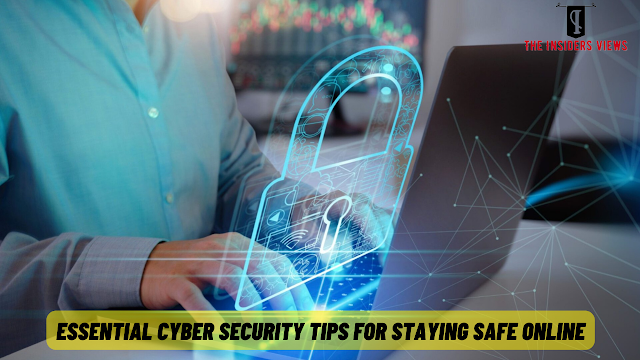Essential Cyber Security Tips for Staying Safe Online
In today's digital age, cyber-attacks are becoming more frequent and sophisticated. As we rely more and more on technology in our personal and professional lives, it's crucial to take steps to protect ourselves from the risks associated with online activity. This article will provide you with 15 essential cyber security tips to safeguard your online presence.
 |
| Essential Cyber Security Tips for Staying Safe Online |
Keep Your Software Up-to-Date
One of the simplest ways to protect yourself from cyber attacks is to keep your software up-to-date. This includes not just your operating system but also your web browser, antivirus software, and any other applications you use regularly. Updates often contain important security fixes that can protect you from the latest threats.
Use Strong Passwords
Using strong passwords is an important step in securing your online accounts. Avoid using easily guessable passwords such as your name or birthdate. Instead, use a combination of uppercase and lowercase letters, numbers, and symbols. You should also avoid using the same password across multiple accounts.
Enable Two-Factor Authentication
Two-factor authentication is an extra layer of security that requires a second factor, such as a code sent to your phone, in addition to your password. Many online services offer this feature, and it can provide significant protection against unauthorized access to your accounts.
Be Cautious of Phishing Scams
Phishing scams are a common form of cyber attack that attempts to trick you into giving away your personal information. These scams often involve emails or messages that appear to be from a legitimate source, such as your bank or social media account. Always be cautious of unexpected emails or messages and don't click on links or download attachments unless you're sure they're safe.
Use a Virtual Private Network (VPN)
A virtual private network (VPN) encrypts your internet connection, making it more difficult for hackers to intercept your online activity. This is especially important if you're using public Wi-Fi networks, which are often less secure than private networks.
Backup Your Data Regularly
Backing up your data regularly is an important step in protecting yourself from data loss due to cyber-attacks or hardware failure. You should keep a copy of your important files and documents on an external hard drive or cloud storage service.
Be Careful about What You Share Online
Be mindful of what you share online, including personal information such as your address, phone number, and date of birth. Avoid oversharing on social media and be cautious of who you connect with online.
Use Antivirus Software
Antivirus software can help protect your computer from malware and other types of cyber threats. Make sure to keep your antivirus software up-to-date and perform regular scans to ensure your computer is protected.
Use Encrypted Messaging Apps
Encrypted messaging apps, such as Signal and WhatsApp, provide an additional layer of security by encrypting your messages, making it more difficult for hackers to intercept your communications.
Use a Firewall
A firewall is a network security device that monitors incoming and outgoing network traffic and can block unauthorized access to your computer or network. Many operating systems come with built-in firewalls, but you can also purchase third-party firewalls for additional protection.
Be Wary of Public Wi-Fi Networks
Public Wi-Fi networks are often less secure than private networks, making it easier for hackers to intercept your online activity. Avoid logging into sensitive accounts, such as your bank or email, while using public Wi-Fi.
Secure Your Home Network
Make sure your home network is secure by setting a strong password for your router and enabling WPA2 encryption. You should also change the default username and password for your router and only allow devices you trust to connect to your network.
Educate Yourself on Common Scams
Educating yourself on common cyber scams can help you identify and avoid potential threats. Scams such as tech support scams, lottery scams, and romance scams are all common tactics used by cybercriminals.
Use Common Sense
Ultimately, using common sense is the best way to protect yourself from cyber-attacks. Don't click on suspicious links or download unknown attachments, be cautious of unexpected emails or messages, and always keep your software up-to-date.
In conclusion, cyber-attacks are a real threat in today's digital age, but by following these essential cyber security tips, you can protect yourself from potential threats. By using strong passwords, enabling two-factor authentication, being cautious of phishing scams, and using a VPN, you can safeguard your online presence and keep your personal information secure.
FAQs
What is a VPN, and how does it work?
A VPN is a virtual private network that encrypts your internet connection, making it more difficult for hackers to intercept your online activity. It works by routing your internet connection through a remote server and encrypting your data before it leaves your device.
How often should I backup my data?
It's recommended to backup your data at least once a week to ensure you don't lose any important files or documents.
What should I do if I think I've been the victim of a cyber attack?
If you think you've been the victim of a cyber-attack, you should immediately change your passwords, notify your bank or credit card company, and run a full virus scan on your computer.
What is two-factor authentication, and why is it important?
Two-factor authentication is an extra layer of security that requires a second factor, such as a code sent to your phone, in addition to your password. It's important because it provides an additional layer of protection against unauthorized access to your accounts.
How can I tell if an email or message is a phishing scam?
Phishing scams often involve emails or messages that appear to be from a legitimate source, such as your bank or social media account. Be cautious of unexpected emails or messages and don't click on links or download attachments unless you're sure they're safe.





Post a Comment